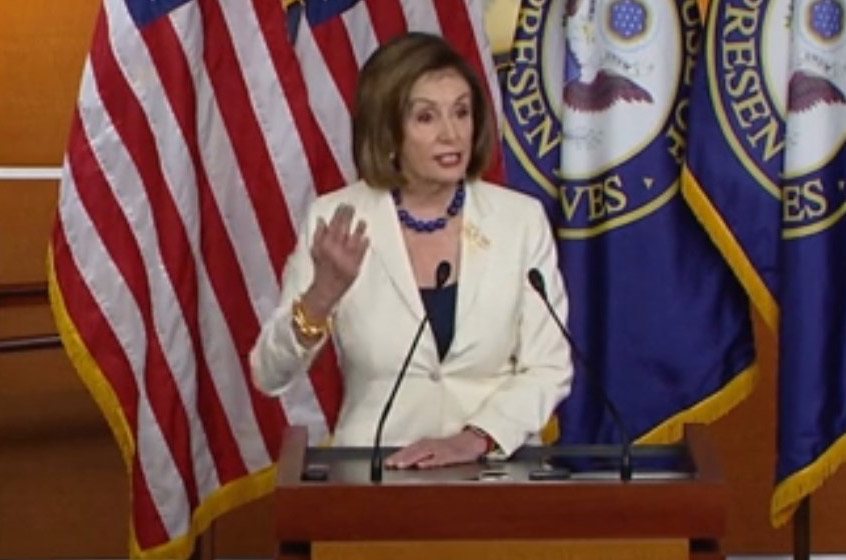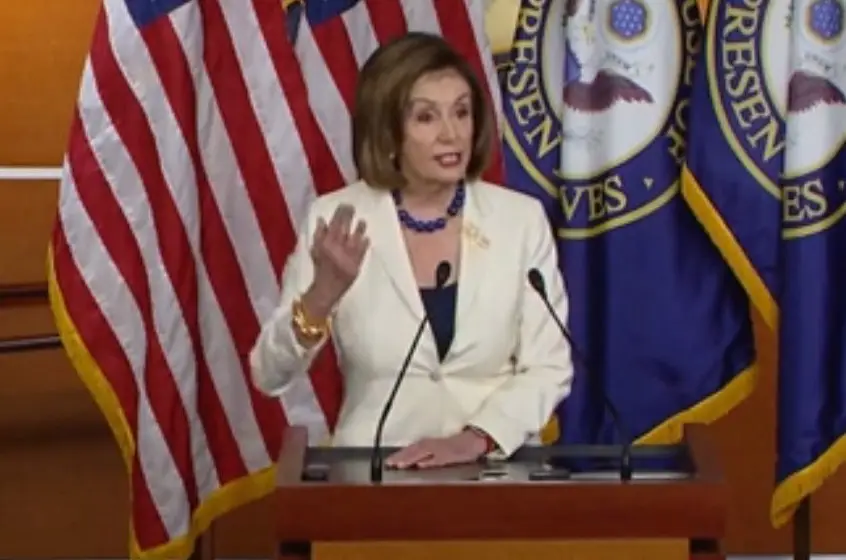WASHINGTON – Speaker of the House Nancy Pelosi signaled Thursday, Dec. 5, the Democrat-controlled chamber is committed to holding a vote soon to impeach President Trump.

Pelosi announced she is asking the chairmen of House of Representatives committees investigating the president to draft articles of impeachment. An impeachment vote reportedly could occur before Christmas.
“The facts are uncontested,” she told reporters. “The president abused his power for his own personal political benefit at the expense of our national security by withholding military aid and [a] crucial Oval Office meeting in exchange for an announcement of an investigation into his political rival.”
Some Democrats have called for the impeachment of Trump for a variety of reasons since he took office in 2017, but the focus of the impeachment inquiry approved by the House in a nearly party-line vote Oct. 31 is on a late July phone call between Trump and new Ukrainian President Volodymyr Zelensky.
In the call, Trump appeared to encourage Zelensky to investigate former Vice President Joe Biden, a leading Democratic candidate to face the president next November, and his son Hunter, who was on the board of a Ukrainian natural gas company. In addition, Trump delayed the transfer of nearly $400 million in congressionally approved military aid to Ukraine before the call.
In a Dec. 5 tweet, Trump said the Democrats “have no impeachment case and are demeaning our Country…Therefore I say, if you are going to impeach me, do it now, fast, so we can have a fair trial in the Senate, and so that our country can get back to business.”
Pelosi’s announcement came a day after Democratic representatives affirmed her intention during a closed-door meeting. When she asked, “Are you ready?” the Democrats shouted their support, The Washington Post reported.
Also on Dec. 4, three lawyers called by Democrats told the House Judiciary Committee the president had committed impeachable offenses, which the U.S. Constitution defines as “Treason, Bribery, or other high Crimes and Misdemeanors.”
Based on the testimony and evidence before the House, Trump “has committed impeachable ‘high crimes and misdemeanors’ by corruptly abusing the office of the presidency,” Harvard Law School professor Noah Feldman said. Trump “openly abused his office by seeking a personal advantage in order to get himself re-elected,” he testified.
Michael Gerhardt of the University of North Carolina School of Law and Pamela Karlan of Stanford Law School agreed.
Jonathan Turley – a George Washington University Law School professor called by Republicans – told the committee, however, there was “not compelling evidence of the commission of a crime” and warned against a “slipshod impeachment.”
“I am concerned about lowering impeachment standards to fit a paucity of evidence and an abundance of anger,” he said. “I believe this impeachment not only fails to satisfy the standard of past impeachment but would create a dangerous standard for future impeachment.”
After the lawyers’ testimonies, Judiciary Committee chairman Jerrold Nadler of New York said he had listened to “consistent, clear and compelling evidence that the president has abused his power, attempted to undermine the constitutional role of Congress, and corrupted our elections.”
Rep. Doug Collins, the lead Republican on the committee, decried the Democrats’ failure to have witnesses of fact and apparent decision to depend on the work of other committees.
“What a disgrace to this committee – to have the committee of impeachment simply take from other entities and rubber stamp it,” said Collins, a Southern Baptist from Georgia.
Pelosi announced Sept. 24 she was instructing six committees to investigate the president for possible impeachment. No action by the full chamber was taken until the Oct. 31 roll call, when the House voted 232-196 for a resolution instructing committees to continue their investigations into whether evidence exists to impeach Trump and establishing rules for the process. No Republican members voted for the resolution, while only two Democrats voted against it.
On Dec. 3, the House Permanent Select Committee on Intelligence approved in a party-line vote a 300-page report that said Trump abused his office for political gain and obstructed the investigation.
If the Judiciary Committee approves articles of impeachment, the entire House would hold a vote. Only a majority would be required to impeach the president. If impeachment takes place, the Senate would hold a trial, with Chief Justice John Roberts presiding. A two-thirds majority would be needed to convict and remove Trump from office.
Impeachment inquiries have been held for three previous presidents: Andrew Johnson in 1868; Richard Nixon in 1974; and Bill Clinton in 1998. Johnson and Clinton were impeached, but the Senate failed to convict either president. Johnson survived by only a vote. Nixon resigned before the Judiciary Committee sent articles of impeachment to the House.
Written by Baptist Press, the official news service of the Southern Baptist Convention.

